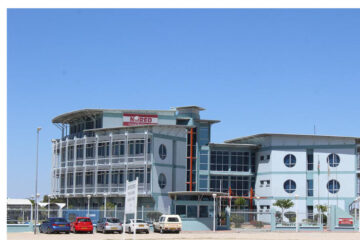Stefanus Nashama
The Landless People’s Movement (LPM) alleges that the recent arrest of its leaders and councillors in the Karasburg Town Council is driven by a political agenda from those in power, intended to discredit the party.
The party has labelled the arrest as a ‘witch-hunt’ and claims the actions specifically targeted LPM leaders. Last week, the Anti-Corruption Commission (ACC) detained Karasburg Town Council Mayor Maria Veldskoen, Acting Chief Executive Officer Hansina Isaaks, and other council members, accusing them of contravening local authority governing laws.
Paulus Noah, the ACC’s Director-General, confirmed the arrests. He reported that the accused individuals had dismissed administrative officers who had resisted implementing unlawful council decisions, alleging that these persons acted with “absolute impunity.”
However, LPM views these arrests as politically motivated attempts to hinder the party’s political role in the council. Last Friday, a statement by LPM’s National Spokesperson, Lifalaza Smataa, claimed the ruling party manipulated ACC in a political smear campaign.
According to the statement, the LPM leaders were not charged until late on the second day, directing suspicions at ACC. Smataa alleged the party had to intervene due to ACC’s missteps. He also claimed their leaders were denied legal representation.
Smataa revealed that the entire council had decided to temporarily alter the bank account signatories to ensure payments to creditors.
“At the time, the former CEO was dismissed due to alleged connections with fraud charges against the former CFO. Currently, the former CEO hasn’t been charged, despite ACC being informed from the beginning,” he stated.
Highlighting inconsistencies, Smataa pointed out two distinct events: an administrative decision and alleged gratification involving the former CEO, a Swapo member yet to be charged.
LPM asserts that the ACC might continue its underhanded tactics as the case progresses. They believe the charges are exaggerated and the intervention is unwarranted.
Smataa stressed that these were corruption allegations, not criminal charges warranting ACC arrests.
Challenging the ACC’s approach, Smataa asked why they would allow the matter to be contested in court if they were so confident in their case.
Paulus Noah responded, emphasizing that the ACC strictly adheres to its laws, regulations, and procedures in its fight against corruption.
The Karasburg Council has been caught up in internal power struggles, notably involving CEO Nico Titus, who dealt with suspension and office access issues.
These tensions persisted despite mediation attempts by the Minister of Urban and Rural Development, Erastus Uutoni, culminating in a directive to reverse decisions about signatory authorization powers and the appointment of CEO Hansina Isaaks.




